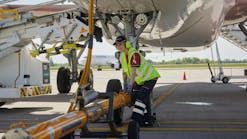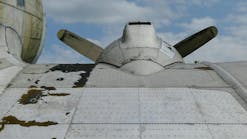Several U.S. airlines announced plans Tuesday to reduce flying this year to counter rising fuel prices and the drop in travel after Japan's devastating earthquake and tsunami.
Even airlines that do not fly to Japan have felt the impact.
At an investor conference in New York, US Airways Group Inc. president Scott Kirby said bookings fell more than 20 percent in the first few days after the March 11 crisis in Japan, as people worldwide were glued to their televisions and stayed home.
"General Motors basically stopped all non-essential travel until they sort out their supply chain," Kirby told the J.P. Morgan Aviation, Transportation and Defense conference.
Bookings remain down a couple of percentage points because of Japan's resulting nuclear crisis, but Kirby said he thought the effect was "psychological" and temporary. "The underlying demand remains very strong," he said.
US Airways, Philadelphia's dominant airline, will reduce fourth-quarter systemwide available seats or flights by up to 2 percent from previously announced levels, he said.
Most major airlines have raised ticket prices eight times this year - four of the fare increases led by Delta Air Lines Inc. - to cope with $104-a-barrel oil, up 41 percent since Labor Day. "However, pricing alone won't cover the dramatic rise we've seen in fuel prices," said Delta president Edward Bastian.
Delta's capacity cuts have been the most aggressive. The nation's No. 2 airline in size said it was cutting flying to Japan 15 percent to 20 percent through May, as that country recovers.
Delta operates the most U.S. flights to Japan and has suspended service to Haneda Airport near Tokyo. Delta will continue serving Tokyo's Narita International Airport.
"Our expectations are that this is somewhere between a six- to nine-month, one-time event," Bastian told investors.
About 8 percent, or a little more than $2 billion, of Delta's annual unit revenue "touches Tokyo" and the revenue loss of the earthquake and aftermath will be $250 million to $400 million, he said.
Delta says it expected to cut transatlantic flying about 4 percent starting this summer, and domestic flying by 3 percent from 2010. The biggest hit will be service in Memphis, where departures will be trimmed 25 percent.
Delta also will retire 120 of its least fuel-efficient aircraft over the next 18 months.
"We're not anticipating any significant moderation" in fuel prices, Bastian told the J.P. Morgan conference.
Executives said airlines were better prepared now than in 2008 to deal with higher fuel costs because of capacity cuts made earlier, new "ancillary" revenue for checked baggage and other amenities, and industry consolidation from the mergers of Delta with Northwest Airlines and United with Continental.
Discount carrier Southwest Airlines Co., Philadelphia's second-busiest airline, said at the conference that it still intended to increase capacity this year 5 percent to 6 percent.
"We've been forced to pursue fare increases for the obvious reason with surging oil prices in 2011," said chief executive officer Gary Kelly, "and at the same time, we've seen very strong demand."
Southwest has raised fares six times in the last 90 days, Kelly said. "That's a lot. Our traffic has held up more than well."
United and Continental - now called United - said in a regulatory filing Monday that it will cut domestic flying 2 percent to 3 percent this year and increase international flying 3 percent to 4 percent compared with 2010. Overall flying will be roughly the same as last year.
"A lot of people ask me how the business is going," said Jeff Smisek, chief executive officer of United Continental Holdings. "I say, well, if you take fuel and Japan aside, let's talk."
Contact staff writer Linda Loyd at 215-854-2831 or [email protected].





